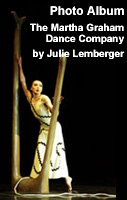






Go
back to Flash Reviews Flash Review 1, 6-5: ABT Scales
"Onegin" By Alicia Mosier It's beginning to get a bit perplexing, the way American Ballet Theatre manages to inspire its dancers to such extraordinary heights after wedging them into productions with eight-foot ceilings. That was the case with David Parsons's "The Pied Piper," which premiered two weeks ago, and it is even more staggeringly the case in John Cranko's "Onegin," the 1965 Stuttgart Ballet production (revised in 1967) which ABT -- the first American company to acquire the work -- performed for the first time on Friday at the Metropolitan Opera House. "Onegin" is a major acquisition for ABT, whose search for new evening-length works has led it down such dubious paths as, well, "The Taming of the Shrew" (another Cranko blockbuster, seen last year). Sumptuous and crowd-pleasing as it is, showing ABT in its full chandelier-and-drapery mode, "Onegin" is a decidedly mixed bag: both emotionally sweeping and ridiculous, both dramatic and dull, made up of equal parts bombast and weak tea, and bearing only a tenuous resemblance to (and sometimes betraying outright) the poem by Pushkin and the opera by Tchaikovsky on which it is based. All of that said, and returning to my original perplexity, Julie Kent, Robert Hill, Maria Riccetto, and Vladimir Malakhov gave superb performances Friday as Tatiana, Onegin, Olga, and Lensky -- performances which, especially in the case of Riccetto and Malakhov, contained some of the finest examples of theatrical dancing I have ever seen. In his translator's note to the 1977 Penguin edition of Pushkin's poem, Charles Johnston wrote that "there is a whole magic [to the poem] which goes by default: the touching lyrical beauty, the cynical wit ...; the psychological insight, the devious narrative skill, the thrilling, compulsive grip of the novel; the tremendous gusto and swing and panache of the whole performance." Those elements, which make a verse translation difficult, make a translation into another art form even more challenging. The poem tells the story of a perfectly educated and perfectly bored aristocrat, Eugene Onegin, who with his friend Lensky makes his way to the country home of a bourgeois family. Lensky, his head filled with Romantic poetry, is in love with one of this family's daughters, Olga. The other daughter, Tatiana, is the quintessential Russian heroine: artless, intelligent, given to daydreaming at the window and reading romance novels and Rousseau. She falls head over heels for Onegin, and stays up all night writing him an impassioned love letter which, the next day, he tears up before her eyes, with the explanation that he's outgrown that sort of thing and that by accepting her love he would only be taking advantage of her naivete. Tatiana is shattered. A little while later, Lensky invites Onegin back to the country house for Tatiana's birthday party. Tatiana has a horrible dream filled with portents about both men. When they arrive, Onegin -- bored again -- amuses himself by flirting with Olga, which provokes Lensky into challenging him to a duel. They fight, and Lensky is killed. For the next several years, the listless Onegin drifts from one place to another, until one night he turns up at the house of Prince Gremin, who in the interim has married Tatiana. Onegin is astonished at her elegance: she's now a far cry from the little girl whom he rejected. Overcome by the anguish of his mistake, he writes her a letter as impassioned as the one she wrote to him so long ago. Tatiana refuses to see him, but when he bursts into her room she is overwhelmed by memories of her earlier love. But now it is she who refuses his letter: suggesting that he's only attracted to the show of her newly fancy life at the palace, she tells him that he still hasn't understood her, and that she will not now accept him. Here's how Johnston translates Tatiana's final words to Onegin: "Bliss was so near, so altogether attainable! ... But now my lot is firmly cast. I don't know whether I acted thoughtlessly or not: you see, with tears and incantation mother implored me; my sad station made all fates look the same ... and so I married. I beseech you, go; I know your heart: it has a feeling for honour, a straightforward pride. I love you (what's the use to hide behind deceit or double-dealing?) but I've become another's wife -- and I'll be true to him, for life." In the heartbreaking irony and pathos of this poem, Cranko (who, like Pushkin, died relatively young) seems to have seen only the crudest outlines of a drama. At least that's what his ballet, set to a pastiche of Tchaikovsky tunes, suggests. It never reaches for those elements Johnston describes, never moves beyond the basics of the libretto. Even so, failures of storytelling abound, most egregiously in the scene where Onegin tears up Tatiana's letter, which Cranko sets in the middle of her birthday party, thus forcing Tatiana to keep on dancing with her guests after her whole world has been destroyed. (On the other hand, *something* has to happen at that party besides Lensky getting peeved....) Scenes like this happen again and again in the ballet. In the first act, Onegin introduces himself in a solo in which he repeatedly sweeps his hand against his forehead (read: listlessness); he dances distractedly with Tatiana, who simpers around him on her pointes; and just when an interesting relationship begins to take shape, Eric Otto leaps in and Sean Stewart does an arial and all the family friends join hands and scamper. At Prince Gremin's palace, Onegin demonstrates his anguish by brooding amidst a whirl of gorgeous women. He stands blackly in the middle of the room for ten full seconds, then all of a sudden he goes away and the party guests come bubbling on. Any semblance of an emotional moment is intruded upon by a lively little number. Our experience of the narrative consists of bits of hyper-concentrated intensity surrounded by froth. There are three major group scenes in "Onegin" -- the garden party in Act I, the birthday party in Act II, and the ball at Prince Gremin's palace in Act III. All are messy masses. Cranko's attempts at Russian-style folk steps for the friends in Act I are half-hearted at best; his attempts at an elegant waltz in Act III are even worse. The nobility of some of his dance phrases is nullified by some fuzzy thing that's going on in front of them. The lack of architecture in these scenes is matched by the lack of dynamic momentum in solos (in Lensky's solo before the duel, all you see are preparations) and the lack of sinew in the many long pas de deux. Cranko "reads" us Tatiana's letter to Onegin by showing them in an imaginary dance together in her bedroom. Onegin hops in through the mirror and spends a good five minutes literally sweeping her off her feet. I wouldn't want to be hauled around like that even in my sleep. These duets look hemmed in even when they're moving at top speed (though I did like the lovely "sitting" lift Kent and Hill do in their concluding pas de deux -- *not* the ridiculous fanny lift of Act I -- in which Kent looks like she's resting on a chaise lounge in the air). They're Kenneth MacMillan-esque without MacMillan's gift for showing -- through something other than grimacing or grinning, as in Cranko -- the subtle varieties of passion that occur in a single passionate encounter. In short, they're Soviet-style harangues. Two of the pas de deux almost escape this shipwreck. Amidst the gavottes and gowns in the Act II party (the costumes and sets, in burnished red and gold and blue, are by Jurgen Rose), Olga and Lensky dance out a terrific drama that shows how their relationship has deepened since they first danced together in a luscious duet in Act I. Half the time, however, they're partially obscured by the relentless frolicking of the other guests. In Act III, Prince Gremin lifts and leans the red-gowned Tatiana through a stunning pas de deux infused with the gentleness and maturity of married love. (It also includes, courtesy of Carlos Molina as the Prince, the softest shoulder-sit in memory -- and the loveliest descent.) One might explain the difference by noting that in neither of these pas de deux does Onegin appear. Maybe Cranko is saying that Onegin can't have a fulfilling relationship? Perhaps, but as Pushkin tells it, Tatiana really loves him and thinks there's much in him to admire ("a feeling for honour, a straightforward pride"). There's nothing to see in this Onegin, and so Tatiana comes across as more stupidly infatuated than she might already seem. Only a failure of choreographic imagination could make Tatiana and Onegin less interesting than Olga and Lensky, and this is what Cranko has done. His secondary characters are tremendous. Malakhov gives Lensky a terrifically sunny temperament, an ironical smile, and long, lush balances in arabesque. This is a true Pushkinian poet. (Malakhov probably grew up reading Pushkin.) Riccetto, an outstanding corps member who with this performance makes herself a star, has a modest, faultless technique and the full complement of gifts as an actress. These two in these roles are the best thing in the ballet; it's well worth going just to see them. Compared to the exploratory dances Cranko creates for these two roles, his choreography for Tatiana and Onegin tells us little more about who they are than we already know. But Julie Kent and Robert Hill pour themselves into their characters with abandon. Hill, looking every bit the distinguished cad, brings strong shading to a part whose emotional colors are pretty much limited to inky black (like his costume -- get it?). Kent is always a wonder in roles that offer her a chance to complexify a character. Here, despite the limited range the ballet keeps her to, she takes Tatiana from a completely believable girl to a completely believable wife, as her dresses go from pale pink to red to elegant brown. The really dramatic scenes don't give her much to work with (mostly grinning or grimacing; see above); the pure dance solos, while demanding, come out of nowhere and go right back again. But from the moment she meets Onegin -- actually, from the moment we see her reading in a corner while her family is gossiping around a table -- Kent reveals with every expression a purity and a conflict that point toward the Tatiana of Pushkin's poem, whom Cranko's prolix ballet does little to conjure up. "Onegin" continues at ABT through June 7. |
|||||||



